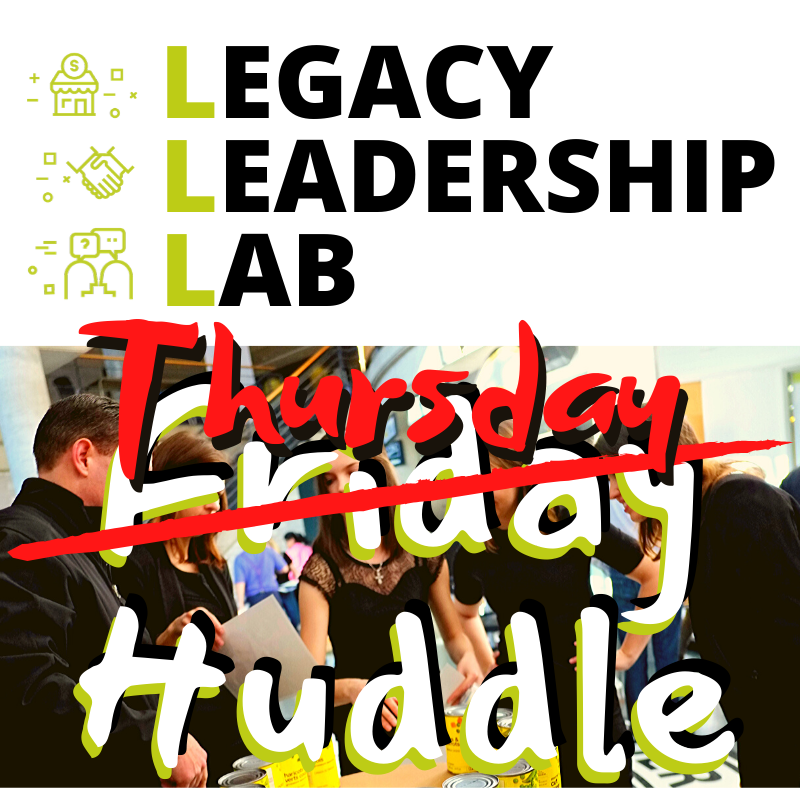Every Friday at 1pm EDT, L3 convenes an open discussion to source insights and ideas around social acquisitions and conversions of small businesses in Canada. This is a recap of last week's Huddle (April 3rd).
Join us this coming week for a Friday (nope, that’s a holiday) Thursday Huddle, April 9th at 1pm! The Zoom link is: https://zoom.us/j/230593272 .
Coming in swinging

One of the Huddlers last week came in swinging with her own ideas on supporting a particular business recovery strategy that would involve reimagining or redesigning traditional business financing models like Employee Share Ownership Plans, to help younger people buy into businesses.
Another Huddler had already done some research into what kinds of models and governance structures could be leveraged for community-led acquisitions, and was looking to accelerate that work in response to the COVID-19 economic crisis.
Market-based approach
Naturally, the conversation led to questions around what kind of policy approaches might support businesses during the economic crisis. The fact is that our approach has always been around market-based solutions. We aim to support the design, testing, and launch of products and services that will facilitate social acquisitions, and we do this by assembling organizations, companies, and consultants that are already in the business of supporting small businesses, social enterprises, and co-ops.
That said, L3 researchers have explored (.pdf) what enabling environments look like for co-operative businesses, and we are very happy to work with researchers and other groups focused on policy. Our social innovation-based events and knowledge products are a perfect avenue for policy makers into industry perspectives and experiences.
The big questions: who, what, where to prioritize?
One Huddler highlighted the difficulties around what and where to prioritize business recovery efforts, particularly at a time like this when nearly every industry, actor, sector, and region needs support. Most businesses and stakeholders will act in spaces where money can be found simply by necessity, whether in the form of investments, tax relief, or grants. But many organizations, we noted, are justifiably reluctant to follow where the money leads if the priorities are return our systems to “business as usual,” a similar sentiment to what our Huddlers discussed the week before. The truth is that the answer of who, what, and where to prioritize efforts will be different for every sector, every region, and even every single business owner.

Join this week's huddle!
Join the Zoom conversation at 1pm EDT this Thursday April 9th: https://zoom.us/j/230593272.
Connect!
Join our mailing list here.
Follow us on Facebook and Twitter.
Join our LinkedIn group here.
About Legacy Leadership Lab (L3)
L3 is an 18-month initiative by the Waterloo Institute for Social Innovation and Resilience, funded by the Government of Canada’s Investment Readiness program. We are leading five Workshops from coast to coast to help build expert-driven solutions for Canada’s transitioning small business community. During these Workshops, the we will develop market interventions and prototypes that allow conventional and social finance players, business service providers, and community leaders to facilitate social purpose conversions of existing businesses in their own towns.
About Waterloo Institute for Social Innovation and Resilience (WISIR)
WISIR is a research institute at the University of Waterloo’s School of Environment, Enterprise and Development committed to generating trans- and inter-disciplinary knowledge about social innovations and the social innovation process (the dynamics of learning, adaptation and resilience). Our approach is to pursue collaborative research and projects that bridge University of Waterloo departments, involve researchers from around the world, and engage those beyond academia. We seek to mobilize this knowledge through a range of new curriculum offerings and training opportunities - both within and outside of a university setting.